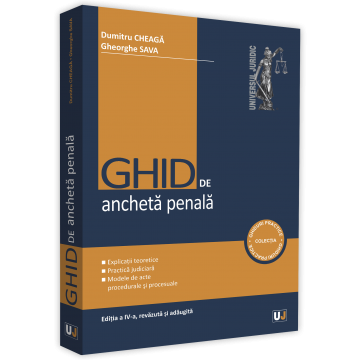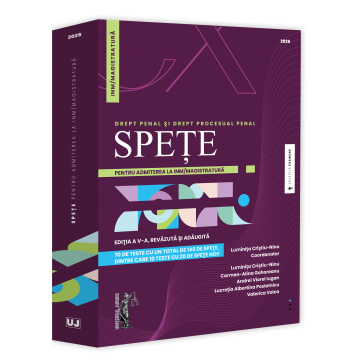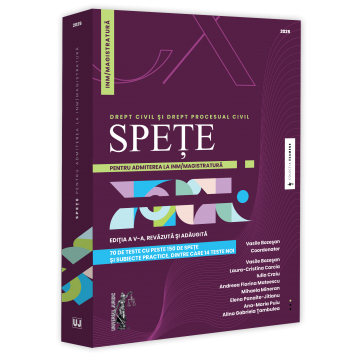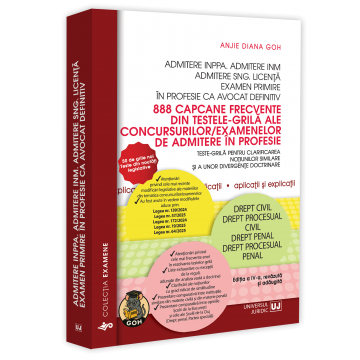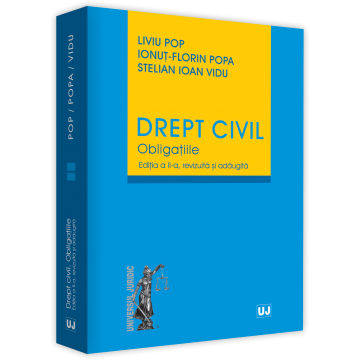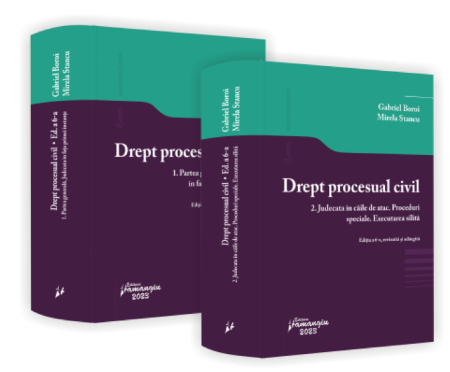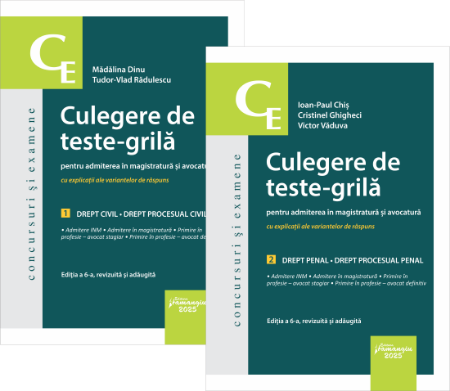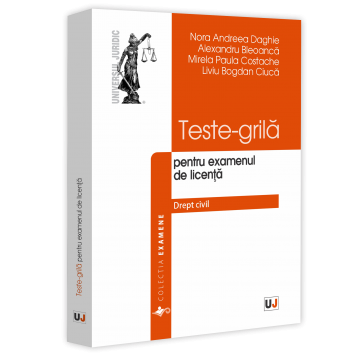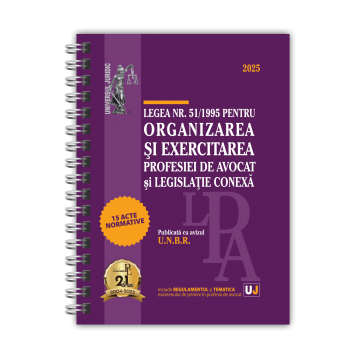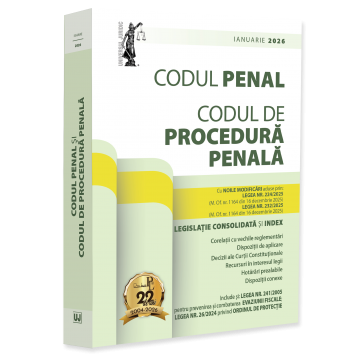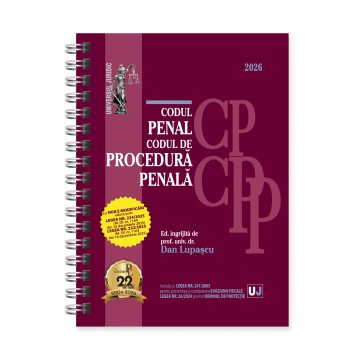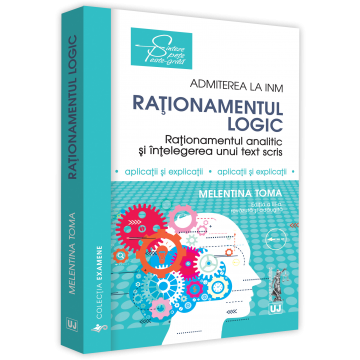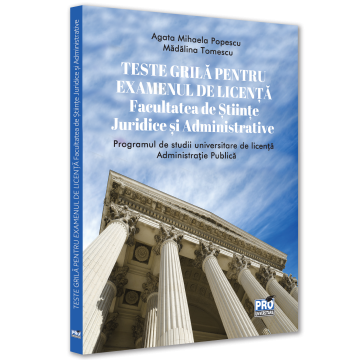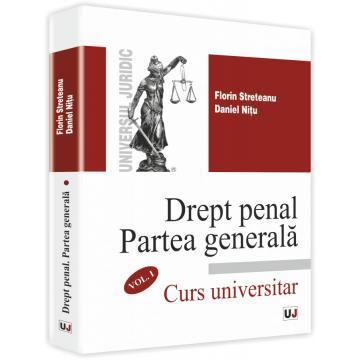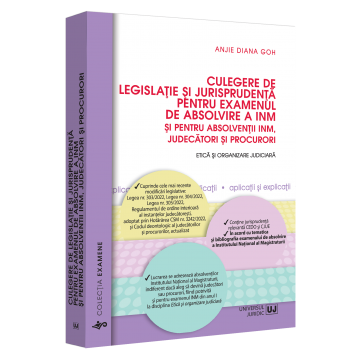ISBN: 978-606-591-848-1
DOI: 10.5682/9786065918481
Publisher year: 2013
Edition: I
Pages: 261
Publisher: Editura Universitară
Author: Dragos Calin - Coordonator, Luminita Gabura, Cazac Dumitru, Diana Chibulcutean, Iulia Diana David, Augustina Rodica Moldovan, Ioana Alexandra Precup, Oana-Maria Stefanescu, Dan Alexandru Sipos
- Description
- Download (1)
- Authors
- Content
- More details
- Reviews (0)
-
Lawyers in the jurisprudence of the European Court of Human Rights. Relevant decisions
Download
Judge at the Bucharest Court of Appeal, trainer of the National Institute of Magistracy for continuous professional training European Union law, international judicial cooperation in civil and commercial matters, labor law and social insurance law; associate scientific researcher of the Institute of Legal Research of the Romanian Academy - Center for European Law Studies, director of the Journal of the Judges Forum, member of the scientific college of the journal Jurisclasor ECHR, co-editor of the Journal iaduer.ro - European Legal Affairs, founding member and co-president Romanian Judges Forum Association (2007-present), member of the GEMME Europe Board of Directors (May 2010-present), vice-president of GEMME Europe - European Grouping of Magistrates for Mediation (May 2010-May 2012), founding member of CIMJ International Conference on Mediation for Justice), October 2009, Paris.
Cazac Dumitru
Student, Faculty of Economic, Legal and Administrative Sciences of the "Petru Maior" University of Targu Mures
Diana Chibulcutean
Student, Faculty of Economic, Legal and Administrative Sciences of the "Petru Maior" University of Targu Mures
Iulia Diana David
Student, Faculty of Economic, Legal and Administrative Sciences of the "Petru Maior" University of Targu Mures
Luminita Gabura
Student, Faculty of Economic, Legal and Administrative Sciences of the "Petru Maior" University of Targu Mures
Augustina Rodica Moldovan
Student, Faculty of Economic, Legal and Administrative Sciences of the "Petru Maior" University of Targu Mures
Ioana Alexandra Precup
Student, Faculty of Economic, Legal and Administrative Sciences of the "Petru Maior" University of Targu Mures
Oana-Maria Stefanescu
Student, Faculty of Law, West University of Timisoara
Dan Alexandru Sipos
Student, Faculty of Law, West University of Timisoara
Preface / 5
Article 4 of the Convention - Prohibition of slavery and forced labor / 15
1. Non-violation of art. 4 par. 2 of the Convention. The obligation of a lawyer to fulfill the function of legal guardian does not represent forced or compulsory labor. (Graziani – Weiss v. Austria, judgment of 18 October 2011, application no. 31950/06) / 15
Article 6 of the Convention - Right to a fair trial / 23
1. The fine applied to a lawyer for defying the court, by the judge who had solved the case in the first instance, after the trial and the rejection of the appeal. The right to an impartial court. (Alenka Pečnik v. Slovenia, judgment of 27 September 2012, application no. 44901/05) / 23
2. The applicant, who was suspected of initiating bodily harm, was detained and heard as a witness after being sworn in. The Court found that the applicant was not a mere witness, but a person against whom an accusation was made in criminal matters and therefore had the right to remain silent. The situation was all the more serious as the applicant had not been assisted by a lawyer until 20 hours after his detention. (Brusco v. France, decision of 14 October 2010, application no. 1466/07) / 31
3. Even when compelling reasons may exceptionally justify the refusal to insure a lawyer, such a restriction - whatever its justification - must not unduly prejudice the rights deriving for the accused from art. 6. In principle, the rights of the defense are irreparably affected when incriminating statements made during an interrogation by the police, without the possible assistance of a lawyer, are used as grounds for a conviction. (Diriöz v. Turkey, judgment of 31 May 2012, application no. 38560/04) / 35
4. The State authorities did not respond to the applicant's need for a defense in order to achieve a fair trial. In the case, the lawyer was present at the hearing, but was silent. He did not hear witnesses and did not intervene in favor of the applicant. Thus, the limitation of the right to defense - by preventing the applicant from presenting his evidence and defense - is incompatible with the principle of a fair trial. (Falcao dos Santos v. Portugal, judgment of 3 July 2012, application no. 50002/08) / 41
5. The right to the assistance of a lawyer. The applicant was imprisoned for several months, which complicated the process of informing and finding a lawyer, both because of his situation as a detainee and his lack of knowledge of the internal procedure. By refusing to adjourn the trial, the authorities, in the circumstances of this case, violated the applicant's right to have the time and facilities necessary to prepare his defense and to be assisted by a lawyer, as guaranteed by Art. 6 par.3 lit. b) and c) of the Convention. (Katritsch v. France, judgment of 4 November 2010, application no. 22575/08) / 44
6. Violation of art. 6 para. 1 of the Convention. In the case, the applicant faced a panel of three judges, one of whom was the uncle of the opposing party's lawyer and the brother of the lawyer who represented the opposing party in the proceedings at first instance, whose conduct was the subject of the appeal. The close family ties between the opposing party's lawyer and the Chief Justice were sufficient to objectively justify the fear that the full court president is not impartial. Malta is a small country, and the existence of whole families of legal practitioners is common. (Micallef v. Malta, judgment of 15 October 2009,
application no. 17056/06) / 53
7. The guarantees provided by art. 6 par. 1 of the Convention does not apply to the representative of the prosecutor's office who ordered the prosecution of a plaintiff for the unlawful exercise of the profession of lawyer, the prosecutor's office being one of the parties to an adversarial judicial procedure. (Mihai Ganga and the Independent Union of Lawyers of Romania v. Romania, decision of inadmissibility of April 10, 2012, application no. 28906/09) / 68
8. Violation of art. 6 of the Convention. In the circumstances of the case (a judge had declared, in an official framework, namely the General Assembly of Judges of the Court of Cassation in Paris, support for an investigating judge in conflict with the applicant), the impartiality of the French Court of Cassation could raises serious doubts and objectively justified fears to the applicant. Freedom of expression also applies to lawyers, who have the right to speak in public about the functioning of justice, but criticism must not exceed certain limits. (Morice v. France, decision of 11 July 2013, application no. 29369/10) / 77
9. Disciplinary proceedings against a lawyer. Failure to comply with the requirement of a reasonable time in a case in which the procedure lasted 9 years and 11 months at three levels of jurisdiction. (Müller v Hartburg v. Austria, judgment of 19 February 2013, application no. 47195/06) / 93
10. Violation Article 6, paragraph 1, in conjunction with Article 6, paragraph 3, of the Convention. The applicant complained that, by not allowing the lawyer to build his defense in his absence and rejecting the appeal, without a substantive examination, he had violated his right to go to court. fair trial and the right to defend oneself through a lawyer. (Neziraj v. Germany, judgment of 8 November 2012, application no. 30804/07) / 108
11. Denunciation by the lawyer of the legal assistance contract 10 days before the trial term. Any improper exercise of the activity by the lawyer ex officio or chosen by the accused cannot be imputed to the state. Considering the independence of the bar from the state, the manner of exercising the defense represents an aspect that is, in principle, related to the accused and to the lawyer chosen or appointed ex officio. Even in the case of a lawyer appointed ex officio, art. 6 par. 3 lit. c of the Convention does not oblige the authorities to intervene only when the lack of training of the lawyer is obvious or when they are informed in due time about this aspect. (Sfez v. France, judgment of 25 July 2013, application
no. 53737/09) / 114
12. Violation of the principle of security of legal relations. Contrary to its settled case-law, which confirms the right of a person with at least 10 years of experience in a legal profession to be accepted into the bar without examination, the Supreme Court has adopted an opposite solution in the applicant's case. it could be qualified as a reversal of the jurisprudence due to a new interpretation of the law, because the court did not explain in any way the reasons for the change of its position and later returned to its constant jurisprudence. The decision in question was found to be singular and arbitrary, which led to the violation of the principle of security of legal relations. (Ilie Serban v. Romania, decision of 10 July 2012, application no. 17984/04) / 117
13. Admission to law without examination. Non-unitary practice at the level of the supreme court. The jurisprudential uncertainty that led to the rejection of the plaintiffs' actions, to which is added the absence of a mechanism capable of ensuring the unification of judicial practice at the level of the highest domestic jurisdiction, resulted in depriving the plaintiffs of the right to be admitted to the bar without examination. what other persons in similar situations have been granted this right. (Stefan and Stef v. Romania, decision of 27 January 2009, applications no. 24428/03 and 26977/03) / 122
14. Search and confiscation of documents at the home of a lawyer, authorized by an internal court. Presumption of tax fraud. The national procedure that violates the provisions of art. 6 of the Convention. The protection of professional secrecy is a corollary of the right of a lawyer's client not to contribute to his own incrimination, which means that the authorities try to substantiate their motivation without resorting to evidence obtained by coercion or pressure, violating the will of the accused. (Marc André and SCP André, André et Associés v. France, judgment of 24 July 2008, application no. 18603/03) / 127
15. Searching the domicile of a lawyer with the right to practice in the European Union, without observing the special procedural guarantees. (Xavier Da Silveira v. France, decision of 21 January 2010, application no. 43757/05) / 135
16. Violation of art. 6 par. 3 of the Convention. The right to the assistance of a lawyer in a trial in which the applicant was charged with a crime against a judge and which called into question the integrity of the Bulgarian judiciary. Although it is not disputed that the applicant had a university degree, there is no indication that he had legal training. (Zdravko Stanev v. Bulgaria, judgment of 6 November 2012, application no. 32238/04) / 140
17. The right to legal assistance and the liability of states in the case of an international rogatory commission. (Stojkovic v. France and Belgium, judgment of 27 October 2011, application no. 25303/08) / 147
18. The right to free legal aid is one of the constitutive elements of the concept of a fair trial in criminal proceedings. In the case, the applicant did not have sufficient means to support the representation through a lawyer chosen before the Supreme Court of Cassation, being unemployed and financially dependent on his parents. Violation of Article 6, paragraphs 1 and 3 of the Convention. (Tsonyo Tsonev v. Bulgaria - no. 3, judgment of 16 October 2012, application no. 21124/04) / 150
Article 8 of the Convention - The right to respect for private and family life / 160
1. The refusal of the Athens Bar Association to grant the applicant's application for registration in the Bar on the ground that she was not a Greek national, although she had been allowed to complete an 18-month traineeship without invoking this issue, constitutes a violation of Art. 8 of the Convention in terms of life private. The condition of citizenship when receiving the profession of lawyer did not violate art. 14 on the prohibition of discrimination. (Bigaeva v. Greece, judgment of 28
May 2009, application no. 26713/05) / 160
2. Non-violation of art. 8 of the Convention. The obligation of lawyers to declare money laundering suspicions on the part of clients does not disproportionately affect professional secrecy. (Michaud v. France, decision of 6 December 2012, application no. 12323/11) / 164
3. Violation of art. 8 of the Convention. Searching and collecting electronic data from a law firm. The principle of professional secrecy must not be hindered by the collection of documents or the hearing of the lawyer's employees as witnesses. Special reasons for allowing the search, given the specific circumstances prevailing in a law firm. (Robathin v. Austria, judgment of 3 July 2012, application no. 30457/06) / 175
4. Violation of art. 8 of the Convention. Search of a lawyer's office, in his absence, or of his representative.
(Turán v. Hungary, judgment of 6 July 2010, application no. 33068/05) / 184
Article 9 of the Convention - Freedom of thought, conscience and religion / 186
1. The refusal of the court to postpone a hearing in court proceedings, at the request of the lawyer, a member of the Mosaic cult, given that the date originally set to fall on a day corresponding to an important religious holiday, did not harm in any way disproportionate to the applicant's religious freedom. It was appreciated, on the one hand, that he could ensure his substitution in order to fulfill his professional obligations, and, on the other hand, the legitimate aim pursued by the authorities at the time of refusing to postpone the case, respectively the need to defend the rights of litigants. and ensuring the trial within a reasonable time, justifies the measure taken. (Francesco Sessa v. Italy, judgment of 3 April 2012, application no. 28790/08) / 186
Article 10 of the Convention - Freedom of expression / 193
1. The unjustified conviction of a lawyer for criticizing the prosecutor from the prosecutor's office next to the court of appeal in a criminal proceeding represented a violation of the right to freedom of expression provided by art. 10 of the Convention. (Alfantakis v. Greece, judgment of 11 February 2010, application no. 49330/07) / 193
2. Slanderous statements of a lawyer to some magistrates. Non-violation of art. 10 of the Convention. The action of the courts, which are guarantors of justice and whose mission is fundamental to the rule of law, requires public trust in order to function effectively. Thus, it is necessary to protect them against slanderous attacks without a factual basis. (Karpetas v. Greece, judgment of 30 October 2012, application no. 6086/10) / 195
3. By ordering the applicant to pay the costs, which included the successful lawyer's fees, generated by the loss of the lawsuit for which she was obliged to pay compensation for the publication of the incriminated articles, Article 10 of the Convention was violated. (MGN Limited v. The United Kingdom, judgment of 18 January 2011, application no. 39401/04) / 199
4. Violation of art. 10 of the Convention. Professional secrecy. Disclosure by a lawyer of information from an expert report to the press. The families of the victims had a real interest in publishing this information and the pressure on them, whose existence had to be proven, was not able to prevent the proper conduct of the investigation. (Mor v. France, judgment of 15
December 2011, application no. 28198/09) / 214
5. Violation of art. 10 of the Convention. Limits of freedom of expression. The conviction of a lawyer, a famous politician of the time, following the publication of the volume L’épreuve, les preuves !, in which he recalled facts during the trial of a criminal case. (Roland Dumas v. France, judgment of 15 July 2010, application no. 34875/07) / 219
Article 11 of the Convention - Freedom of assembly and association / 224
1. As regards the regulation of the legal profession in Romania and the prohibition established by law to practice the legal profession in a bar that is not part of the National Union of Romanian Bars, regarding the dissolution of the association "Bonis Potra", the Court of considered that it was a measure provided by law, pursued a legitimate purpose, namely the defense of public order and the protection of the rights and freedoms of others, especially those who turn to lawyers to defend their interests, being necessary in a democratic society, because the association had undertaken acts concrete for the establishment of bars outside the system of the National Union of Romanian Bars, which contravened the law in force. (Pompiliu Bota v. Romania, decision of inadmissibility of 12 October 2004, application no. 24057/03) / 224
Art. 1 of the Additional Protocol no. 1 to the Convention - Protection of property / 233
1. The violation would t. 1 of Protocol no. 1 additional to the Convention. It is not reasonable for a lawyer to join a social security system to protect himself from the complete loss of his pension, in case he could lose the right to practice law, because this is an exceptional risk. (Klein v. Austria, the decision of March 3, 2011, application no. 57028/00) / 233
2. Non-violation of art. 1 of Protocol no. 1 additional to the Convention. When she decided to leave the country, the applicant, a lawyer by profession, signed a declaration renouncing her Romanian citizenship, having as a direct legal effect, provided by law, the loss of her civil and social rights, including the right to a pension for the limit of age. The fact that the applicant paid contributions to the Lawyers' Insurance House, from whose fund the old-age pension is financed, did not in itself entitle her to continue receiving a pension once she no longer fulfilled all the conditions provided by law for the payment of pensions. . (Maria Elisabeth Puricel v. Romania, decision of inadmissibility of 14 June 2011, application no. 20511/04) / 241
3. Non-violation of art. 1 of Protocol no. 1 additional to the Convention. Proportionality. Exclusion of the applicant from the bar due to the fact that he had been a judge in the former German Democratic Republic, pronouncing political convictions prior to 1989. Analysis of the clientele as a patrimonial value, constituted as a result of exercising the profession of lawyer. (Peter Döring v. Germany, decision of inadmissibility of 9 November 1999, application no. 37595/97) / 252
The lawyer is the essential element of achieving a fair justice; its approach is to promote and defend the rights, freedoms and interests of clients, in full legality. One of the essential conditions for admissibility at the European Court of Human Rights is that of going through the entire procedural cycle before national courts: the existence of an obligation that at least in the last procedural stage, often the recourse in our legal system, the representation of the client's interests through professional services, through a lawyer, it is necessary and useful, maybe also to frustrate the aplomb of the requests to the ECHR (with an unnatural 97% of inadmissibility for Romania). Of course, a problem of ethics and professionalism arises for those lawyers who insist on sending the client to the ECHR to try what they probably know, respectively the solution of inadmissibility. This volume could be a way to individualize the essential role of the lawyer in a democratic society, his understanding not only of the benefits of the person-who-can-try, but also of the responsibilities incumbent on him.
Although the character of this book is the lawyer, we will be able to better understand the laws of other states - this volume, beyond bringing to the public's attention the application of the Convention ..., by translating some less used cases in our literature - makes a information and management service for the rights and obligations of lawyers from other states. This volume is, at the same time, an approach by which the rights of lawyers are highlighted - for example, the right to an impartial court (Alenka Pečnik v. Slovenia, judgment of 27 September 2012, application no. 44901/05).
The team that contributed to this volume is made up of students who translated the causes. They were participants and opponents in the "Fiat Justice" contest, 2013 edition; The national competition for human rights advocates "Fiat Justice", this year at its ninth edition, is organized by Petru Maior University of Targu Mures, in partnership with the University Publishing House and the Romanian Association of European Law and Affairs ( ARDAE). The edition was coordinated by Dragos Calin, judge at the Bucharest Court of Appeal. It remains for the reader - professional or layman of law - the obligation to understand and transpose into his life the civilizing elements contained in decisions, which can be considered legal short stories.
Prof. univ. Dr. Mihai Sandru,
President of the Romanian Association of European Law and Affairs (ARDAE)

6359.png)
![Lawyers in the European Court of Human Rights. Relevant decisions [1] Lawyers in the European Court of Human Rights. Relevant decisions [1]](https://gomagcdn.ro/domains/editurauniversitara.ro/files/product/large/avocatii-in-jurisprudenta-curtii-europene-a-drepturilor-omului-hotarari-relevante-1225-219905.jpg)
